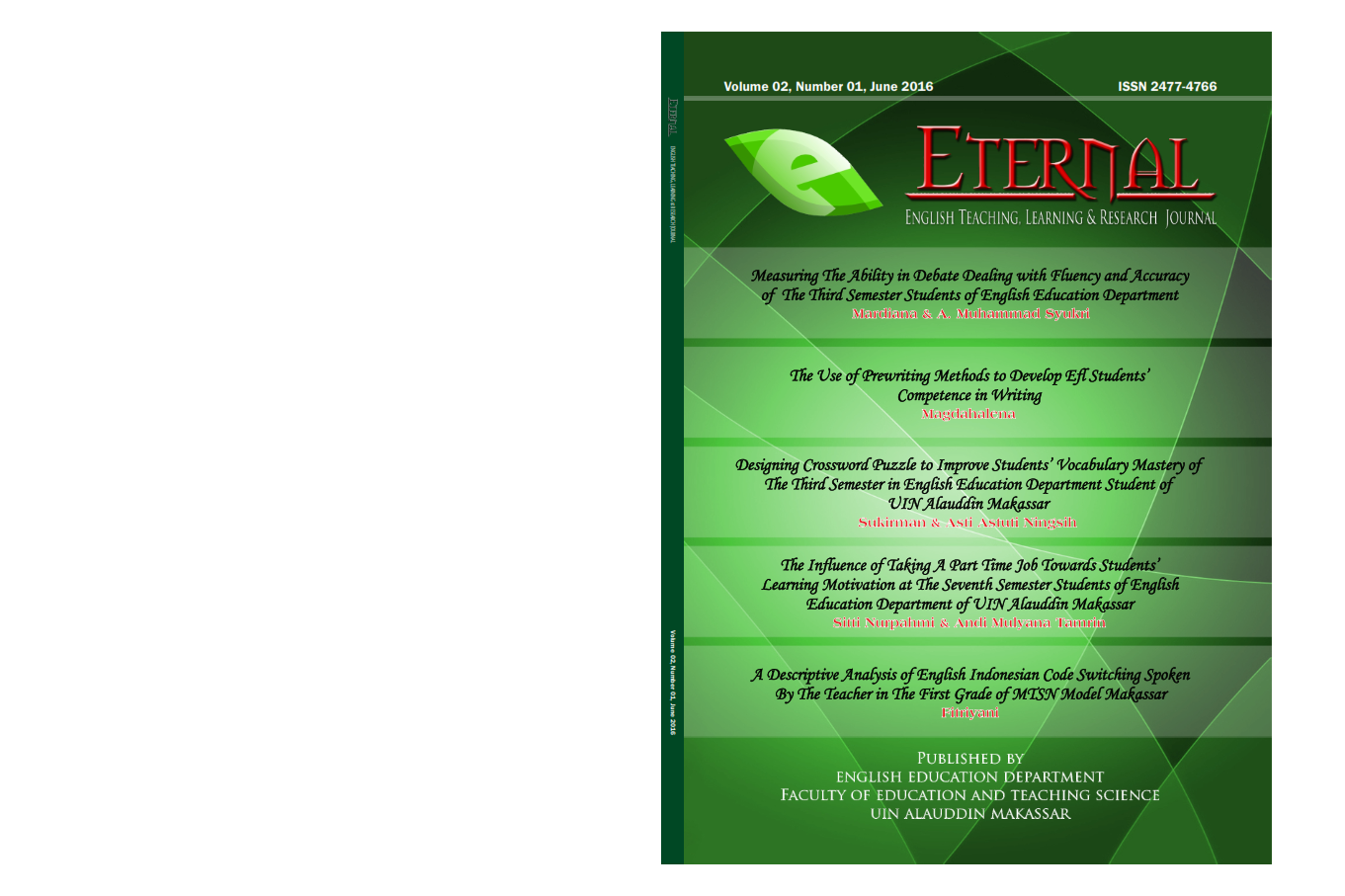MEASURING THE ABILITY IN DEBATE DEALING WITH FLUENCY AND ACCURACY OF THE THIRD SEMESTER STUDENTS OF ENGLISH EDUCATION DEPARTMENT
Abstract
This study aimed to describe the ability of speaking skill in form of debating based on the fluency and accuracy rate capability. The study was designed in the form of qualitative descriptive study. The subjects in this research were six third semester students of English Education Department. The data were collected by using the methods of observation. Data were analyzed through fluency accuracy data, accuracy mesurement rubric and autenthic debate assessment rubric.
The result indicated that (1) the ability of students’ at the third semester in conducting the debate still in the low level, as the fact that the frequency of stutters was significantly high and the tension attempted were quite visible and audible; (2) the outcome result of the rate of accuracy of the third semester students of English Education Depertment in conducting a debate was still low. The fact was gained by the actual fact in the field during the observation where pronunciation errors and basic grammar mistakes were still spotted in several places; (3) the debate ability of the third semester students of English Education was still low and need a further guide and developement
Based on these findings, it can be concluded that the overall capability of students’ in conducting the debate was still unsatisfying. And as a suggestion that a three-stages structured debate forum club empowerment among students was highly recomended as a form of concern to enhance the intereset as well as the ability of the students to perform a public-speaking skill such as debating.
Downloads
References
Arikunto, S. (2013) Prosedur Penelitian Suatu Pendekatan Praktek. Jakarta: Rineka Cipta.
Bygate, M. (2001) Effects of Task Repetition on the Structure and Control of Oral Language. Oxford University Press.
Crookes, G. (1989) Planning and Interlanguage Variability. Studies in Second Language Acquisition. Cambridge: Cambridge University Press.
Culatta, R., & Goldberg, S.A. (2000) Stuttering Therapy: An Integrated Approach to Theory and Practice. Boston: Allyn and Bacon.
D’Cruz, Ray. (2003) Australia-Asia Debating Guide. Melbourne: The Australian Debating Federation.
Ellis, R. (2002) Grammar Teaching –Practice or Consciousness-raising? In J. C. Richards, & W. A. Renandya. Methodology in Language Teaching: An Anthology of Current Practice. Cambridge: Cambridge University Press.
Ellis, R., & Barkhuizen, G. (2005) Analysing Learner Language. Oxford: Oxford University Press.
Foster, P., & Skehan, P. (1996) The Influence of Planning and Task Type on Second Language Performance. Studies in Second Language Acquisition. Cambridge: Cambridge University Press.
Goh, C.C.M. (2007) Teaching Speaking in the Language Classroom. Singapore: SEAMEO Regional Language Centre.
Gregory, H., Hill, D. (1996) Stuttering Therapy Manual: Workshop for Specialists. Illinois: Northwestern University.
Heaton, J. B. (1988) Writing English Language Tests. New York: Longman Handbook for Language Teacher.
Hornby, A.S. (1974) Oxford Advanced Learner’s Dictionary. Oxford: University Press.
Inoue, Chihiro. (2010) Investigating the Sensitivity of the Measures of Fluency, Accuracy, Complexity and Idea Units with a Narrative Task. Lancaster: Lancaster Universty.
Kromos, J., & Denes, M. (2004) Exploring Measures and Perceptions of Fluency in the Speech of Second Language Learners. New Jersey: Lawrence Erlbaum Associates.
Lennon, P. (1990) Investigating Fluency in EFL: A Quantitative Approach. Language Learning. Michigan Language Learning Research Club, University of Michigan.
Menhert, U. (1998) The Effects of Different Lengths of Time for Planning on Second Language Performance. Cambridge: Cambridge University Press.
Muttaqin, Zainul. (2009) Teaching Conversation Gambits to Enhance Students' Communicative Competence in English Debate. A thesis of IAIN Walisongo Semarang.
O’Malley, J. (1996) Authentic Assessment for English Language Learners. New York. Longman.
Pikulski, J.J., & Chard, D.J. Fluency: (2005) Bridge between Decoding and Reading Comprehension. Delaware: International Reading Association.
Popper, Karl. Karl Popper Debate Format. Retrieved on August 12 2015 from: http://www.debate-motions.info
Quinn, Simon. (2005) Debating. Melbourne: published electronically by the aouthor.
Skehan, P., & Foster, P. (1996) The Influence of Task Structure and Processing Conditions on Narrative Retellings.
Trapp, Robert. (2007) The Debatabase Book. Yogyakarta: International Debate Education Association.
Wigglesworth, G. (1997) An Investigation of Planning Time and Proficiency Level on Oral Test Discourse.
Wiwitanto, Carna. (2009) The Use of Australasian Parliamentary Debate System as an English Interactive Program Based on Disciplined Eclecticism Approach to Implement KTSP in Teaching Speaking. A Thesis of UNS.
Yaruss, J.S. (1997) Real-Time Analysis of Speech Fluency: Procedures and Reliability Training. New York: Thieme Medical Publisher.
Yuan, F., & Ellis, R. (2003) The Effect of Pre-task Planning and On-line Planning of Fluency, Complexity, and Accuracy in L2 Monologic Oral Production.
Copyright notice:
- Authors retain copyright and grant the journal right of first publication with the work simultaneously licensed under a Creative Commons Attribution License that allows others to share the work with an acknowledgement of the work's authorship and initial publication in this journal.
- Authors are able to enter into separate, additional contractual arrangements for the non-exclusive distribution of the journal's published version of the work (e.g., post it to an institutional repository or publish it in a book), with an acknowledgement of its initial publication in this journal.
- Authors are permitted and encouraged to post their work online (e.g., in institutional repositories or on their website) prior to and during the submission process, as it can lead to productive exchanges, as well as earlier and greater citation of published work (See The Effect of Open Access)

